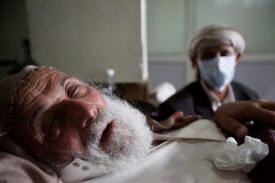|
 U.N.
slams warring parties in Yemen for fueling cholera
outbreak U.N.
slams warring parties in Yemen for fueling cholera
outbreak
 Send a link to a friend
Send a link to a friend
[July 13, 2017] By
Michelle Nichols
UNITED NATIONS (Reuters) - Top United
Nations officials on Wednesday slammed the warring parties in Yemen and
their international allies for fueling an unprecedented deadly cholera
outbreak, driving millions closer to famine and hindering humanitarian
aid access.
|
|
 Since the end of April, the World Health Organisation said there
have been more than 320,000 suspected cases of cholera - a disease
that causes uncontrollable diarrhea - and 1,742 deaths across more
than 90 percent of the Arabian Peninsula country. Since the end of April, the World Health Organisation said there
have been more than 320,000 suspected cases of cholera - a disease
that causes uncontrollable diarrhea - and 1,742 deaths across more
than 90 percent of the Arabian Peninsula country.
U.N. aid chief Stephen O'Brien told the Security Council on
Wednesday the toll was likely much higher as aid workers could not
reach remote areas of the impoverished, war-torn country.
"This cholera scandal is entirely man-made by the conflicting
parties and those beyond Yemen's borders who are leading, supplying,
fighting and perpetuating the fear and the fighting," O'Brien said.
He called on the 15-member Council to "lean much more heavily and
effectively on the parties and those outside Yemen" to end the
conflict and humanitarian crisis.

A Saudi Arabia-led coalition intervened in Yemen's civil war in
2015, backing government forces fighting Iran-allied Houthi rebels.
The country, which relies heavily on imports for food, has become
one of the U.N.'s top humanitarian crises.
"Seven million people, including 2.3 million malnourished children -
of whom 500,000 are severely malnourished under the age of five -
are on the cusp of famine, vulnerable to disease and ultimately at
risk of a slow and painful death," he said.
U.N. Food and Agriculture Organization Director-General Graziano da
Silva said there had already been reports of people dying from
hunger in some areas of Yemen and complained about a lack of funding
and access.
"We simply cannot act where we are most needed," he told the
council.
[to top of second column] |

WHO Director-General Tedros Adhanom Ghebreyesus told the council the
outbreak was "being driven by conflict, the collapse of the basic
public services and malnutrition."
He said the WHO and the U.N. Children's Agency UNICEF were
supporting more than 600 treatment centers and rehydration points in
Yemen and planned to open another 500 centers but there was a
shortage of doctors and nurses.
Yemen's economy has collapsed and 30,000 health workers have not
been paid for more than 10 months, so the United Nations has stepped
in with "incentive" payments to get them to help with the fight
against cholera.
U.N. Yemen mediator Ismail Ould Cheikh Ahmed told the Security
Council a Saudi donation of $67 million had helped slow the cholera
spread and called on other donors to step up.
(Reporting by Michelle Nichols; Editing by James Dalgleish)
[© 2017 Thomson Reuters. All rights
reserved.] Copyright 2017 Reuters. All rights reserved. This material may not be published,
broadcast, rewritten or redistributed.
 |